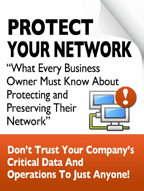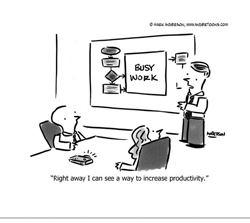
August 2020

The #1 Mistake Companies Make With Their IT
If you’re like many businesses today, there’s a good chance you’ve made this one mistake with your IT security: you don’t budget for it.
Or if you do budget for it, it’s not enough to really protect your business.
Time and time again, business owners decide NOT to invest in IT services. Instead, they go it alone or skip it completely.
Or they might approach an IT services company and ask, “What do you charge for your services?” They don’t ask, “What will I get for my money?” or “How can you meet the needs of my company?”
This is a backward approach to IT – and it’s a big mistake.
The fact is that a lot of business owners don’t take IT seriously. They think that because they haven’t been hit by a data breach or a malware attack that it will never happen to them. That’s another big mistake. Just because a business hasn’t fallen victim to a cyber-attack DOES NOT mean they’re safe.
It’s the opposite.
When you hire an IT services company, what do you get for your money?
The honest answer is that it depends on your specific needs. Many IT services companies offer everything from basic to advanced network security. You can expect services like:
- Cloud backup
- Data protection
- Data monitoring
- Threat detection
- Technology maintenance
- And more!
“We can’t wait to react until something happens. Because when something does happen, it’s often too late.”
you the information and resources you need so you can worry less about outside threats and focus on your customers and the success of your business.
When you’re invested in good IT security, you shouldn’t even know it’s there. It runs in the background like a quiet but powerful electric motor. It’s there when you need it, and it’s there when you’re not even thinking about it.
For some business owners, this is a tough pill to swallow. They don’t have something tangible in front of them that they can see 24/7. A lot of business owners like to be more hands-on. They like to see what their money is buying.
The great thing is that a good IT services company will provide you with something tangible. If you want to see what is going on behind the scenes of your IT security, they will give you a complete report. Every day (or week or month), you can have an e-mail delivered to your in-box that breaks down exactly what your IT services firm is doing for you.
You can see things like the threats they blocked from getting through. You can see when they performed system maintenance or when your data was backed up. You can customize these reports to your needs.
Basically, you can see what you’re paying for and how it’s working. This is the very definition of “peace of mind.”
Today, none of us can afford to skip out on good IT security. We can’t wait to react until something happens. Because when something does happen, it’s often too late. The cybercriminals have done their damage and moved on. Meanwhile, your business comes to a screeching halt, and you have to pay the big bucks to get everything back on track – if you can get back on track.
Some businesses don’t get back on track. They are forced to close after a cyber-attack because they don’t have the money or resources to recover. The damage is simply too much and the cost too high. If they had invested in IT security upfront, it might be a different story.
Don’t get caught off guard by a data breach, malware infection, hacker attack or data loss due to technology failure or natural causes like flood or fire. It’s time to take your IT to the next level. Protect your business the right way and avoid the mistake so many others make when they avoid the investment in good IT.
Work with an IT services firm that takes your business as seriously as you do.
Free Report: What Every Small-Business Owner Must Know About Protecting And Preserving Their Company’s Critical Data And Computer Systems

This report will outline in plain, nontechnical English the common mistakes that many small-business owners make with their computer networks that cost them thousands in lost sales, productivity and computer repair bills, and will provide an easy, proven way to reduce or completely eliminate the financial expense and frustration caused by these oversights.
Download your FREE copy today at www.RangerSolutions.com/thank-you-protect or call our office at 469-202-5777.
Cartoon Of The Month

SHINY NEW GADGET OF THE MONTH
The Manta5 Hydrofoiler XE-1
 If you could ride your bike on the water, would you? Thanks to the Manta5 Hydrofoiler XE-1, you can. The Manta5 Hydrofoiler XE-1 is a high-performance watercraft for people of all ages. The minds
If you could ride your bike on the water, would you? Thanks to the Manta5 Hydrofoiler XE-1, you can. The Manta5 Hydrofoiler XE-1 is a high-performance watercraft for people of all ages. The minds
behind Manta5 wanted to bring cycling to the water – and they succeeded.
The hydrofoil design helps keep you balanced while you pedal across the water, similar to how you pedal on a bike. You can use it on the ocean, in rivers and in lakes. Learning to ride takes practice, but once you get the hang of it, it’s a breeze! It won’t be long until you’re jetting across the water – on your own power! There’s even a small electric motor that brings you up to speed if you need it. Take your summer to the next level and learn more at Manta5.com.
What Should You Do When Your Device No Longer Updates?
 Technology isn’t supported forever. From hardware like the iPhone to software like QuickBooks, developers eventually cease support for older versions of their products. When you buy a new smartphone, for example, you can expect updates for a few years, if not longer. These updates include security patches and new or upgraded features.
Technology isn’t supported forever. From hardware like the iPhone to software like QuickBooks, developers eventually cease support for older versions of their products. When you buy a new smartphone, for example, you can expect updates for a few years, if not longer. These updates include security patches and new or upgraded features.
When the updates stop, the products will still be usable, but they may expose you to outside threats, such as malware or hacker exploits. Whether your hardware or software is for personal or business use, it’s in your best interest to consider an upgrade. Many of us don’t like spending the money, but it is necessary to stay up-to-date and secure. Don’t put your data, or your customer data, at risk by avoiding an upgrade once the updates stop.
The Rest Is My Job
How would you like to be in the position to create the largest army that the world has ever seen (over 13 million soldiers) and do it mainly with people who have NEVER commanded troops in their life?
That was exactly the position General George C. Marshall found himself in during World War II. Not only did he have to assemble this incredible army, but he also had to do it in the shortest amount of time possible. He appointed over 600 people to positions of general officer or division commander, with few “slackers.”
So, what was his secret to being so successful in putting the right people in the right positions? Smart leaders hire people based on their strengths – what the person can do, not what they can’t do.
For example, General Marshall’s aides were worried about him putting a certain colonel, who was known for not getting along with his superiors and being terribly rude, in charge of training. They told Marshall, “If things go wrong and he has to testify in front of Congress, he will be a disaster for you and your reputation.”
General Marshall asked his aides, “What is his assignment … what do we need him for?”
They responded, “To train troops – an entire division.”
Marshall then asked, “Is he a first-rate trainer?”
His aides responded, “Yes sir, General. He is the best we have.”
He said, “Well, give him the assignment. The rest is my job.”
You were put on this earth to have an impact. And that impact is not achieved by sacrificing yourself or your business. Nail the first three levels of sales, profit and order. Then you can give back to the world and make your impact.
 THE REST IS MY JOB. What a great statement. Sometimes a good leader will have to protect, and even defend, some of their subordinates who may have some rough edges when it comes to diplomatically communicating with other bosses or departments. These leaders know they have a high achiever, a real winner, when it comes to getting the job done, and they will do everything they can to protect their asset.
THE REST IS MY JOB. What a great statement. Sometimes a good leader will have to protect, and even defend, some of their subordinates who may have some rough edges when it comes to diplomatically communicating with other bosses or departments. These leaders know they have a high achiever, a real winner, when it comes to getting the job done, and they will do everything they can to protect their asset.
Who would you rather have in a position: 1) the most polite communicator who ruffles no feathers; challenges no person, policy or procedure and has an average performance rating, or 2) a highly focused, determined, loyal, “tells it like it is – good or bad” leader who occasionally upsets those who hindered their progress and is known for always getting the job done? Give me #2 any day – the rest is my job to keep the peace.
Leadership is not about authority. If you are taking the position because it gives you power, supremacy or authority over people, please do not apply. It is a servant position. You are there to help others succeed. It isn’t about you; it’s about them. Hire others for their strengths and let them at it. Learn about the man who created the largest army in the history of the world and who understood we are graded on results … The rest was his job.

Robert Stevenson is one of the most widely recognized professional speakers in the world. Author of the books How To Soar Like An Eagle In A World Full Of Turkeys and 52 Essential Habits For Success, he’s shared the podium with esteemed figures from across the country, including former President George H.W. Bush, former Secretary of State Colin Powell, Tony Robbins, Tom Peters and Stephen Covey. Today, he travels the world, sharing powerful ideas for achieving excellence, both personally and professionally.
The ‘Not Me!’ Problem ...
Remembering 24 different passwords, memorizing four PIN numbers and installing updates all the time is frustrating enough. Many of us also have to remember the code for the door, the alarm code for the alarm panel next to the door, the secret password to tell the alarm company, the passcode to your phone, the garage code … You get the idea.
This logic is based on a time when threats were more “real,” like the idea of someone robbing our house. In 2020, these types of threats are statistically less likely to happen than virtual threats like fraudulent credit card charges, data loss and identity theft. In fact, cyberattacks occur three times as often as home burglaries in the United States, according to a 2016 study by the University of Kentucky.
It’s important to avoid the “Not me!” approach to this shift. Businesses say this all the time: “I’m too small for anyone to want to steal my data. I have a good firewall, hourly backups and a great IT support partner – no one will steal my files.”
But the truth is that businesses with under 100 employees are low-hanging fruit for cybercriminals – yes, that’s a lot of you! It can happen to you, so you must approach all aspects of physical and electronic security with the attention they deserve in today’s business world.
DO YOU HAVE THE RIGHT BUSINESS INSURANCE TO PROTECT YOUR COMPANY?
There are several types of business insurance on the market. Each one serves a different purpose, and getting the right insurance can save you the major headache that comes with not having insurance or having the wrong type of coverage. While we can’t list them all here (there are too many!), here are a few examples:
Commercial property insurance – This is one of the most important forms of insurance. It protects equipment in the business against damage or loss.
General liability insurance – This is
another important one. It helps cover injury
and legal expenses should someone get
hurt on your business’s premises
Cyber-insurance – This offers protection should you fall victim to malware, cyberattacks and other digital threats. Basically, if your business is connected to the Internet, you need extra protection.
Umbrella insurance – This is another layer of protection on top of existing insurance. Exact details vary by plan, but it can often protect you if you need to pay legal fees or costs related to building or equipment damage. Small Business Trends, May 13, 2020



